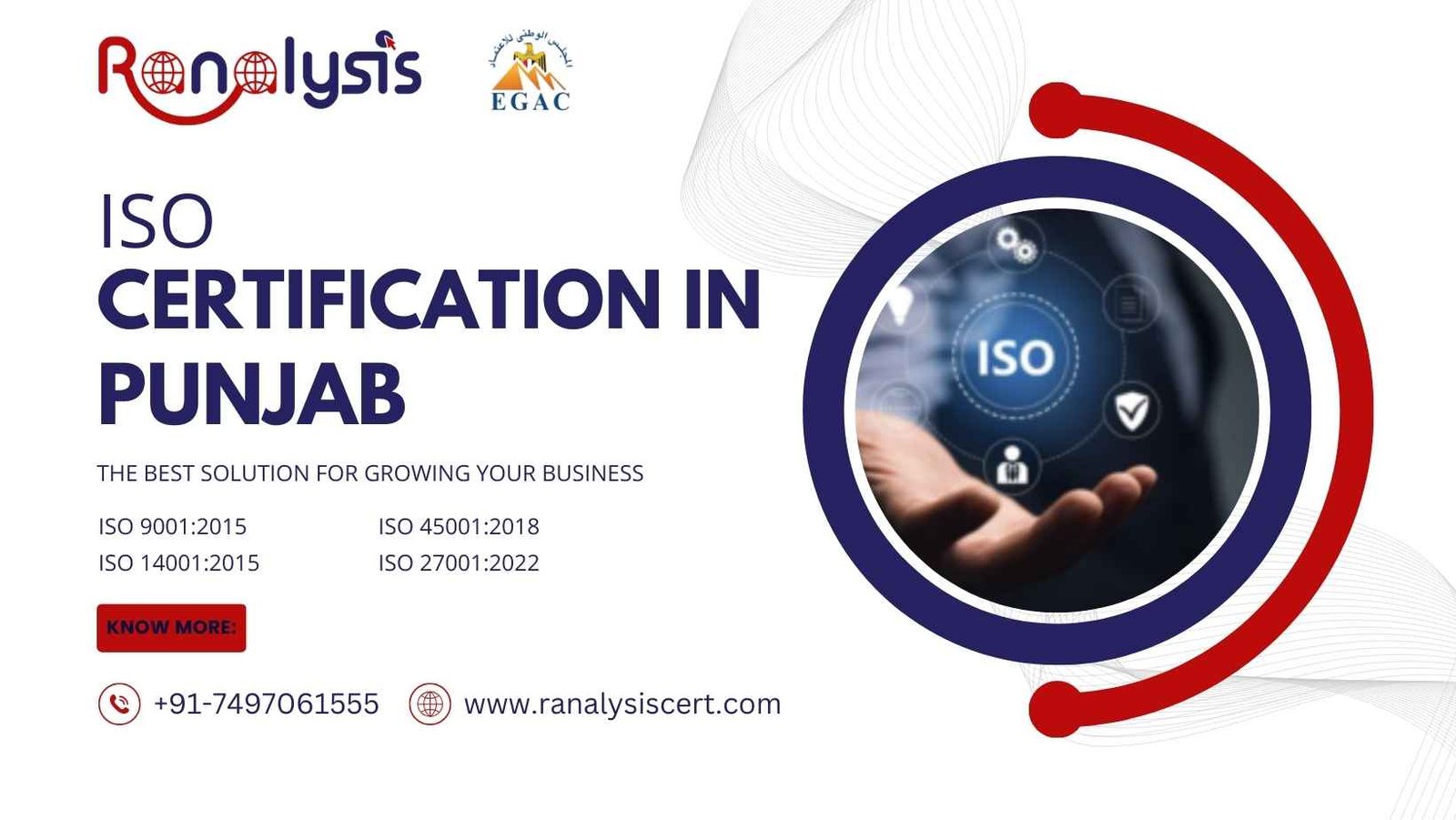
ISO Certification in Punjab: The Solution to Business Growth and Legality
ISO certification in Punjab has become an essential requirement for businesses aiming to establish credibility, improve operational efficiency, and expand their market reach. With Punjab’s industries growing rapidly, adhering to internationally recognized standards is key to staying competitive and earning customer trust. ISO certification helps companies meet global quality benchmarks, enhancing their overall business performance.
Get Free Quotation
Understanding ISO Certification in Punjab
ISO certification in Punjab is a formal approval granted by an external certification body, confirming that a company meets the standards set by the International Organization for Standardization (ISO). These standards apply to various industries, covering aspects such as quality management, environmental sustainability, data security, and workplace safety.
IAF-accredited ISO certification in Punjab is a mark of excellence, attesting that businesses are satisfying globally accepted quality, safety, and efficiency standards. Accredited by International Accreditation Forum (IAF), such a certification guarantees credibility, customer trust, and enhanced market competition. It is required in sectors like manufacturing, health care, information technology, and food processing, in order to reach global standards. It also streamlines business processes, reduces risks, and opens access to global trade.
Why ISO Certification in Punjab is Important
Businesses in Punjab gain multiple benefits from ISO certification, including:
1. Enhanced Quality Standards: Ensures consistency and reliability in business operations.
2. Customer Confidence: Strengthens trust with customers and stakeholders.
3. Global Market Access: Opens doors to international business opportunities.
4. Operational Efficiency: Reduces waste and boosts productivity.
5. Legal Compliance: Ensures adherence to industry regulations and safety standards.
Different Types of ISO Certification in Punjab
Companies can choose from various ISO certifications in Punjab based on their industry and business needs:
- ISO 9001 – Quality Management System (QMS) for operational efficiency
- ISO 14001 – Environmental Management System (EMS) for sustainability
- ISO 45001 – Occupational Health and Safety Management System (OHSMS) for workplace safety
- ISO 27001 – Information Security Management System (ISMS) for data protection
- ISO 22000 – Food Safety Management System (FSMS) for food industry compliance
- ISO 50001 – Energy Management System (EnMS) for energy efficiency
- ISO 13485 – Quality Management System for medical device manufacturers
Documents Required for ISO Certification in Punjab
To ensure a smooth certification process, businesses must prepare the following key documents:
Quality Policy and Objectives – Outlines the company’s commitment to quality and continuous improvement.
Standard Operating Procedures (SOPs) – Detailed guidelines for operational activities.
Risk Assessment Reports – Identifies and mitigates potential risks.
Internal Audit Reports – Evaluates the company’s current compliance with ISO standards.
Corrective and Preventive Actions (CAPA) Records – Documents corrective measures taken to address non-conformities.
Management Review Reports – Summarizes top management’s assessment of ISO implementation.
The Process of Obtaining ISO Certification
✔ Consultation and Gap Analysis – We evaluate your current processes and identify areas that need improvement for ISO compliance.
✔ Documentation Development – Our experts assist in preparing the necessary ISO documentation, including policies, procedures, and manuals.
✔ Implementation of Standards – Businesses integrate ISO standards into their daily operations.
✔ Internal Audit – A preliminary audit is conducted to ensure compliance before the final certification audit.
✔ Certification Audit – Our accredited auditors conduct a thorough assessment to verify adherence to ISO standards.
✔ Issuance of Certification – Once compliance is confirmed, we issue an original ISO certification.
✔ Ongoing Compliance and Surveillance Audits – Periodic audits ensure that businesses continue to meet ISO standards.
Why Choose an Accredited Certification Body?
Selecting a reputable and accredited ISO certification body is crucial for obtaining globally recognized certification. As an accredited certification authority, we ensure:
- Transparent certification processes
- Expert guidance on ISO implementation
- Seamless audit and documentation support
- Ongoing compliance assistance and recertification services
Challenges in Obtaining ISO Certification in Punjab
Many businesses face challenges during the ISO certification process, including:
⚠ Lack of Knowledge: Many businesses are unaware of the certification process.
⚠ Financial Constraints: The cost of certification can be a burden for small businesses.
⚠ Employee Resistance: Resistance to new policies and procedures.
⚠ Documentation Issues: Maintaining proper records and compliance reports.
Final Thought
ISO certification in Punjab plays a crucial role in ensuring business excellence, regulatory compliance, and market expansion. Whether improving quality management, enhancing workplace safety, or securing data protection, ISO certification provides a structured framework for sustainable business growth. Businesses in Punjab should consider obtaining ISO certification to enhance credibility, increase efficiency, and achieve long-term success.
FAQs
ISO certification is a formal recognition that an organization meets international standards set by the International Organization for Standardization (ISO) in areas like quality, environment, safety, and information security.
ISO certification enhances your organization’s credibility, improves operational efficiency, ensures compliance with international standards, and can give you a competitive edge in the market.
We provide certifications for ISO 9001 (Quality Management), ISO 14001 (Environmental Management), ISO 45001 (Occupational Health & Safety), ISO 27001 (Information Security Management), and more.
The steps include:
- Initial consultation and gap analysis
- Documentation review
- Implementation of necessary changes
- Internal audit
- Certification audit by our experts
- Issuance of the ISO certificate upon compliance

